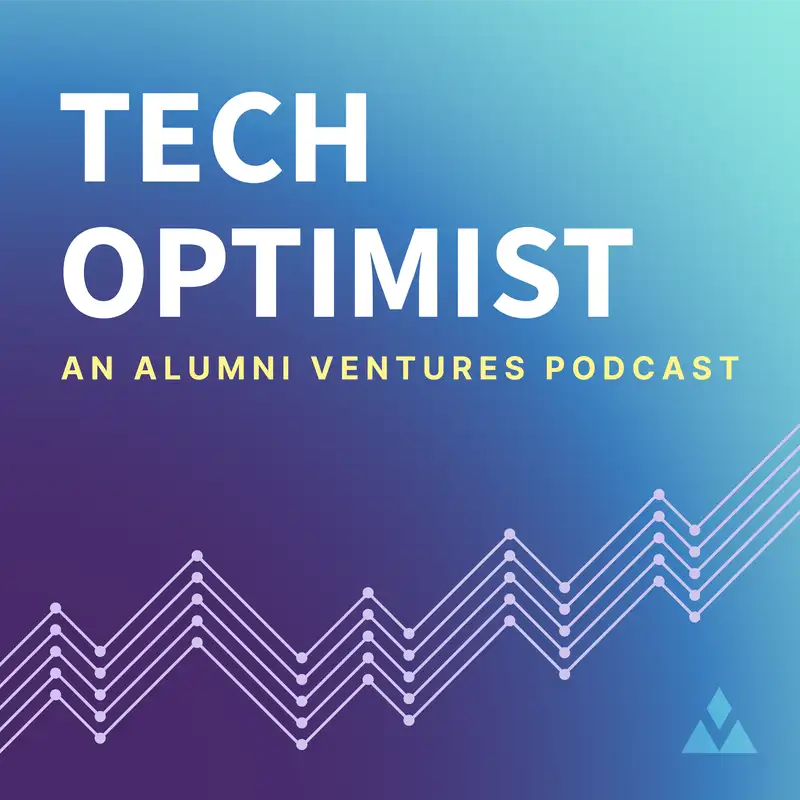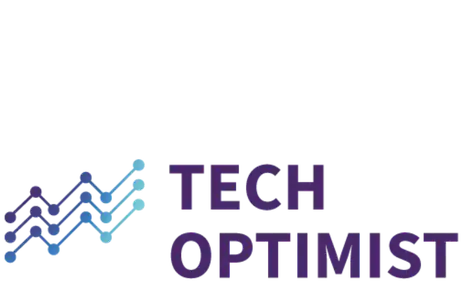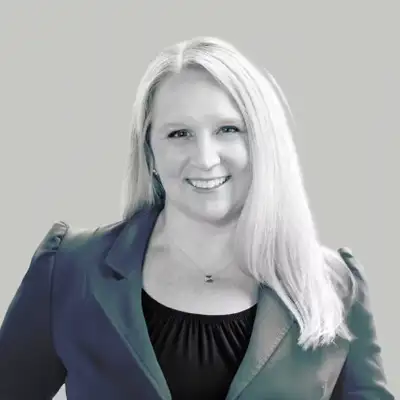#45 - Three Breakthroughs: 529s Are Dead, Sodium Batteries?, and 1 Billion Robots by 2030
Samantha Herrick:
We've got a cool one for you today, AI and Khan Academy, salty batteries and your own Rosie robot.
Mike Collins:
But obviously here at AV, we are also big believers that where companies go to die, which is to innovate in the area of education that there is new potential.
Michael Peri:
If sodium-based batteries can truly be scaled up and brought to market, it's going to dramatically reimagine how we operate with this stuff today.
Mike Collins:
These things tend to be introduced, hyped, disappointment, and then become part of life.
Samantha Herrick:
Hi everyone. Welcome back to this episode of the Tech Optimist. We've got a three breakthroughs episode planned for you today. There's some really awesome topics that take place in this conversation and just some really innovative topics that come up in some insightful conversation.
So of course, we're going to have Mike Collins here on one end of the table that's going to bring us through, founder and CEO of Alumni Ventures. And then his partner in crime is partner, Michael Peri, but we also call him Mike. And then of course, you'll hear my voice. My name is Sam and I'm the guide and editor for the Tech Optimist podcast.
So, a little bit more about the conversation today. One breakthrough that they start to talk about is about AI and education. That's a really cool conversation between Bill Gates and Sal Khan, the CEO of Khan Academy, and then talk about just AI and how it's changing the education sector.
And then Mike Peri brings up a breakthrough involving sodium-based batteries, which in the long term are supposed to be more efficient, more cost-effective, and just better for the environment in general. And then lastly, we land with a topic of humanoid robots. Now the discussion comes up about Tesla's robot, the robot from Figure and a few other snippets sprinkled in here and there.
But I don't want to give away too much about the conversation. So without further ado, here is Mike and Mike as they dish about some of the breakthroughs that they wanted to share with each other this week. We hope you enjoy.
As a reminder, the Tech Optimist podcast is for the informational purposes only. It's not personalized advice and it's not an offer to buy or sell securities. For additional important details, please see the text description accompanying this episode.
Mike Collins:
Tech Optimist podcast brought to you by Alumni Ventures. On this show, I get together with one of our big thinkers. Today, it's Mike Peri, and we talk about things that are hitting our screen as far as breakthrough technologies, things that have potential to put a little dent in the universe. So I think I'm going first today.
Michael Peri:
All right.
Mike Collins:
I just finished Sal Khan's new book. Came out a month or so ago called Brave New Words, which is Sal kind of got an early peek in the ChatGPT. And obviously has been just an incredible entrepreneur, kind of flipping the script on education. I come from a long line of teachers and his work has really made a difference. And I think he speaks really eloquently about something that I think a lot of us are really interested in, which is education and specifically how AI could be a game changer and how he thinks it is going to be a game changer.
I encourage people to check out the book. He also does a really good interview. You can Google with Bill Gates where he talks about it. The Gates family has been early supporters, consistent supporters of Khan Academy. But obviously here at AV, we are also kind of big believers that what has been kind of where companies go to die, which is to innovate in the area of education that there is new potential. And I think I'm going to title this segment, which is Stop Investing in Your Grandchild's 528.
Michael Peri:
529. Yeah.
Mike Collins:
529, excuse me. Definitely the 528, you don't want to invest in. But no, your 529 which by the way, I personally, three kids starting out consistently invested in was a great financial move for me and my family. But I think if you are giving birth this year and you're looking 17 years from now, I am willing to make a pretty strong prediction that their experience is going to be very, very different in 15 years.
Samantha Herrick:
Okay, so along these lines, I did a little dive and I looked up the interview between Bill Gates and Sal Khan, the CEO of Khan Academy. And I found a really fascinating clip from Bill Gates's podcast actually, which is called Unconfuse Me, where they talk about how OpenAI approached Khan Academy and wanted them to sort of help train the AI assistant model to be able to do the AP bio exam.
And when I was doing my AP classes in high school, I can't imagine what doors would open if I had AI as a tool to be able to help me study and to help me prepare for set exam. So, I was very fascinated by this conversation. I'm going to cut it up so it's not the full length of the eight minutes, but here are just some snippets from that conversation. If you want to see the full video, we'll leave the link in the description and in the show notes and all that fun stuff. But regardless, I think it's a really cool conversation.
But first, hang tight. We're going to do an ad and then we're going to go into the conversation with Bill Gates and Sal Khan. And then we'll get right back into the interview where Mike and Mike talk a little bit more about the new state of education and sort of how it's affecting them both personally and how they help to raise their kids.
Matt Caspari:
Hey everyone, just taking a quick break so I can tell you about the Deep Tech Fund from Alumni Ventures. AV is one of the only VC firms focused on making venture capital accessible to individual investors like you. In fact, AV is one of the most active and best-performing VCs in the US, and we co-invest alongside renowned lead investors.
With our Deep Tech Fund, you'll have the opportunity to invest in innovative solutions to major technical and scientific challenges, which can have a hugely positive effect on society, companies that have the potential to redefine industries and create a more sustainable future and deliver significant financial returns. So if you're interested, visit us at av.vc/funds/deeptech. Now back to the show.
Bill Gates:
Welcome to Unconfuse Me. I'm Bill Gates. Let's talk about AI. You and I have both been lucky enough over the last six months or so to have engagement with the mix of both Microsoft and OpenAI and have early access. And I remember some of the best examples of how to get the AI to do fun things were when you came up and saw me and we were brainstorming about this, you were the one who said, "Hey, if you tell it to write a speech, like various politicians including Trump and others," that it's stunning how it captures the voice of different people.
So give us how you first were using the AI and then this is super timely because you've just recently come out with the Khanmigo, if I'm saying that right.
Sal Khan:
That's right, very good. Yeah, I mean, the OpenAI folks reached out and they said, "Hey, we're a couple of weeks away from having the first training of our model," and they wanted to reach out to Khan Academy for two reasons. One was they said, "We want to make this really good at AP biology." And I only found out later, I don't know if this is true. They told me you gave them the challenge.
Bill Gates:
That's right. In June, they kept showing me this thing and I was like, "Yeah, it's kind of an idiot savant. I don't think it's practical. Why don't you see if it can do with the AP biology exam and I'm not going to pay any attention until you can get a five." And I thought, okay, that'll give me three years to work on HIV and malaria.
And these guys, and then it was so bizarre because Sam Altman and Greg Brockman in like August said, "Hey, we want to come show you this thing." And so it was early September when there were like 30 people at my house and I'd said it's the most stunning demo I've ever seen in my life. I mean, right up there, we've seen the Xerox PARC graphics user interface that set the agenda for Microsoft for about 15 years. This demo was so surprising to me, the emergent depth that as they scaled up the training set, its fluency.
And you have to say understanding that computers could not read in the sense humans do, and it couldn't write in the sense humans do and now with lots of footnotes about hallucination and things like that. But I'm still personally in a state of shock at, wow, it is so good and therefore let's see where we can put it to good use.
Sal Khan:
Yeah, no, a hundred percent. And so thank you for that challenge to them. I think they came to us because we have a large library of AP biology questions, et cetera. They're like, "Hey, can we use that to either evaluate or train?" And at the time, I was like, "Well, what's in it for Khan Academy?" I'm in it. And they're like, "Well, maybe you get access to the model."
And I too was skeptical. I had seen GPT-3 at that point, and it was cool, but I don't see how we're going to apply it. Two weeks later, they showed us the AP bio question. He said, "So Sal, what's the answer to this?" And I was like, right. I was like, "Okay, I think it's C." And it said, "Oh, the answer is C." And I was like, oh, that's interesting. I started getting a few goosebumps and I said, "Well, ask it why that's the answer." It explained it.
Bill Gates:
Oh yeah. It's so good at that.
Sal Khan:
Oh yeah. And I mean, I think folks need to realize, because everyone had that moment with ChatGPT. But it was like that, but more because GPT-4 is even better.
Bill Gates:
Way better, yeah.
Sal Khan:
And I said, "Can you say why the other answers aren't correct?" Did it. Then I said, oh. Then I started, I was almost shaking. Then I said, "Can you write 10 more questions like this?" Bam, bam, bam. And the first 10 I saw were all pretty good. I'm like, yeah, yep, that's all legit.
And then the implications for Khan Academy started to go through my mind. And then we did start to get into some of its hallucinations and some of its math errors in those early days. But that weekend, they gave me and our chief learning officer access on Slack. And we just, I couldn't sleep. I was just having these in the rabbit hole conversations with it.
And then we had a hackathon for our team. We got about 40 people on our team under NDA, and we said, just come up with stuff. We were having the debates that everyone was having around, well, the information is not a hundred percent airtight. The math isn't great right now. The costs are not trivial, can introduce bias. What's the safety? How could you use the use of people's information, et cetera.
But then we were starting to get it to work well as something that just helps you answer questions while you're watching a video, to work well as a tutor. And then honestly, every 10 minutes we thought about it like, "Wait, it could also do this. It can also do that. It can also do that."
And so we said, well, what if we could make it so you could talk to any historical character? What if you can make it so it gets into a debate with you? What if you can make it so it doesn't write your paper but it writes it with you? What if it could do lesson plans for teachers? It could be the end of static curricula. I mean, just the imagination kept going.
And by December, January, we had our team in full rapid prototyping mode. Just recently, we launched Khanmigo. And so far, we're starting to titrate it out to the world, giving people access to it. But the feedback is very promising. What we're hearing overwhelmingly from social media and the press is that they're really happy that we've engaged in this and that we're taking a safe approach where parents and teachers can monitor it. We have a moderation filter.
OpenAI has also gone through great pains to make sure that things stay appropriate. You and I have talked extensively about the math issue and we've done some things that I think make it quite robust on top of the things that the model does and the costs are coming down dramatically.
Michael Peri:
This is super timely. I mean, Mike, I think you know this about us. We have a soon to be 4-year-old and a soon to be 1-year-old. And my wife and I have constant discussions around what does the future of education look like for them? From the cost associated with it and yes, we started the 529 early too. So obviously, cost front and center, but even just how curriculum and learning is going to evolve over time.
I think of the framework that OpenAI had put out. Remember there are like five stages of artificial intelligence, and I think we're in the early innings. But as you think about level 3, 4, 5 meaning systems that can take actions, AI that can actually aid in invention and then AI that can do the work of organizations, how is that going to impact education?
And our view is do you have to have the human in the loop? So much of that is the fabric of our DNA culture, the personal skills. So certainly timely in the Peri household, we're talking about this almost on a daily basis.
Mike Collins:
No, and I think a lot of families are. And the money, obviously the unrelenting growth of the cost of education from $20,000 kindergartens to million dollars college education, one, unsustainable. Two, creates huge societal problems. And again, Tech Optimist, we believe that technology can be part of a solution.
And I also believe that there is a lot more to education than imbuing information. And the whole high-tech high-touch thing I think is absolutely at work. But again, I think Sal talks about it very eloquently in a very balanced real world way. And I think he believes that we're looking at really a fundamental change.
And I think one way to think about it is everybody is going to have a personal university customed to their particular interests, needs, learning proclivities. And I think it doesn't take a huge leap. If you are using ChatGPT-4 every day like I do, doing my job, that it is not a hard leap that people are going to have a customized personal AI partner in their educational journey from very early, really beyond throughout their whole life.
I mean, I just got back from Europe, week vacation, and I nerd out on these places. And it's like I had a personal translator, tour guide, history teacher, culinary expert just literally in my pocket. And so again, just to plug a few of our 15 portfolio companies in this space because other partners will give me huge shit if I don't, but we are long on this from professional education to doing research.
I'm just going to have Sam save my breath. I'm going to put up a list of 10 just to pick a few of our portfolio companies that are coming at this from different angles.
Samantha Herrick:
Ask and you shall receive. Don't worry, Mike, I got you. So some companies or some PortCos that are under AV that Mike was talking about, just a few examples are Synthesis School. Synthesis School is an online program created at SpaceX that is now available to kids to encourage creative problem-solving and teamwork.
From their website, education is too important to leave to school. Using advanced teaching techniques and progress in AI, parents no longer have to. Synthesis Tutor does what school was supposed to, show your kids that they can learn anything and that every boring topic is fascinating when taught well.
The Synthesis Tutor is not ChatGPT, but something more effective and personalized. It is custom-built with decades of DARPA research and has proven across thousands of children. The last two years at Synthesis showed that we are better than anyone at how to teach advanced concepts to children.
Another company is Inspira Education Group. Inspira Education Group supports college and graduate school applicants with mentorship, counseling and coaching. Wow, I wish I had this when I was going to my graduate school. That's awesome.
Using AI-enabled tools, the company pairs students with consultants from the world's largest network of admissions counselors based on the individual personality and learning needs. It actively incorporates AI into its core services. The company uses AI-enabled matching algorithms to pair students with consultants, and it uses AI tools to support with counseling and coaching process for college and graduate school applicants.
We also have Panorama Education. Panorama provides a SaaS platform that gives educators tools and data they need to act on and improve student and school outcomes. So it's got AI-powered student support. It utilizes leading multi-tiered system of support software to improve literacy, math, attendance and behavior, social-emotional learning, building students' life skills with assessments, intervention tracking and character surveys. Its platform measures factors related to social-emotional learning and student success in order to improve equity in schools and help educators improve core student outcomes. That's really cool.
And then of course, we have Rally Reader. Rally Reader was another episode on his podcast. You can go back and listen to that. But Rally Reader offers an AI-enhanced e-reading platform for elementary and middle schoolers to improve their reading and literacy skills while engaging educators and parents with detailed progress dashboards.
So an AI-enhanced e-reading platform that acts as a personal reading coach is the AI that they utilize. There's real-time error detection and feedback to improve reading and literacy skills and those personalized learning experiences through word by word accuracy tracking and progress dashboards. Thanks Mike. Back to you.
Michael Peri:
I mean, we could shout out one for our team here in Chicago, Consensus.
Mike Collins:
Yeah, great example.
Michael Peri:
Great example, really reimagining the learning and research side of education. That's just one of plenty. So that list that we're going to share is just representative, I think of tip of the iceberg. And really we'll start to allow our audience to think about just how broad this can be. It could go from research to creativity and book writing to full-on curated ways to engage in learning that just resonate with the student at the end of the day.
Mike Collins:
And again, just to bring it home personally, I'm sure my son will love this, but I have a son enrolling at Columbia MFA program and we talked for a half hour yesterday about how one can use this as even when you're in school today as a huge resource to make your work better. It is a tool. When I went to college, I had a typewriter for god's sake. Word processing was sent from heaven.
And so it's like same thing. It's like it is a tool. It is you and it and you back and forth with it, making the work better. So again, I am short 529s and I am long AI and education and lifelong learning.
Michael Peri:
Yeah. And call to action to anyone out there who's building in this space. We often joke like, oh man, the only thing you don't want to invest in besides healthcare is education because of the sales cycle. I think AI is going to be that breakthrough now. We're going to see this be able to penetrate, distribute in ways that we didn't think about, not even 12 months ago, let alone years ago.
Mike Collins:
I think it's disruption theory, which is a lot of what people have been trying over the last 20, 30 years has been really trying to work with existing frameworks and that just absorbs and treats it like an antibody and kills it. And I think AI is going to kind of circumvent that and it's going to go right to the user and gradually becoming more independent as the child matures.
But I think this one is, the time is right and I think we're going to see real big differences over the next 5 and 10 years in education that are going to be very transformative.
Michael Peri:
Thanks for bringing this one, Mike. This is one I think we could talk about all day every day, especially for folks with young kids thinking about this. So yeah, definitely a great topic.
Mike Collins:
I mean kids hopefully in your future, kids on the plate or grandkids potentially in the future, so it impacts all of us.
Michael Peri:
Exactly.
Mike Collins:
And if none of the above, it's still a huge part of our society that we all live, work, and play in. What do you got, Mike?
Michael Peri:
All right, I've got an exciting one for us today, one that could really change the future of energy storage. On a personal note, my wife and I, we went down the rabbit hole on this topic because we finally upgraded to a plug-in hybrid car. So this breakthrough really caught my attention.
Mike Collins:
Welcome to the club.
Michael Peri:
We're here and we're loving it so far. It's been a very nice welcome to upgrade. So this is really about just reimagining a world in which batteries are not only more affordable, better for the environment, but also way more efficient. And I think the future is closer than we think.
There's some groundbreaking collaboration between researchers at University of Chicago, so shout out to my alma mater there, and UC San Diego. And they've been focused on researching and developing a new sodium-based battery that could be a total game changer for how we store and use energy.
For those out there that this might be new, why is this a big deal? So unlike lithium ion batteries, which we currently rely on, they use materials that are super expensive, scarce.
Mike Collins:
Rare earth metal.
Michael Peri:
Yeah. With sodium-based battery, it uses sodium. It's super abundant, much cheaper, and it's just a much more sustainable option, especially for large-scale energy storage. You have renewable energy grids, we invest a lot in that, obviously electric vehicles.
So they really leaned into this and they said, okay, we have to think about how to tackle challenges that have held back sodium batteries in the past because it's not a novel idea for them to innovate here. And what they did is they started to design a new anode material that's optimized for this electrolyte.
And in the early indications, it's resulting in a battery that performs on par with, or even better than traditional lithium ion batteries. Plus it works really efficiently at room temperature, which is a huge step forward. I think that was part of the big issue. So what does this mean?
Mike Collins:
How does it look at manufacturability? Because obviously, you got to make this stuff at huge scale, right?
Michael Peri:
Yep. So that's it. I mean this is where it's like, so what does this mean for the future? It's got to get off the bench of research. If sodium-based batteries can truly be scaled up and brought to market, it's going to dramatically reimagine how we operate with this stuff today. It's going to reduce definitely dependence on lithium. It's going to significantly lower costs and it's finally going to make renewable energy more practical and widespread.
And I think about that just in my one use case, electric vehicles. Way more affordable, much more accessible and just it eliminates the, okay, how do I have to think about this on a daily basis? So it was a cool one, super timely for us and it's always great to see some innovation out of USC.
Samantha Herrick:
This innovation that Mike has brought to the table today also has been published in what seems to be this podcast favorite, scientific paper publisher which is Nature Energy, and just Nature in general. So they published their paper in Nature, and I'm going to read the abstract because I think that sort of helps round out exactly what we're talking about here.
Anode-free batteries possess the optimal cell architecture due to their reduced weight, volume and cost. However, the implementation has been limited by unstable anode morphological changes and anode-liquid electrolyte interface reactions. Here we show that an electrochemically stable solid electrolyte in the application of stack pressure can solve these issues by enabling the deposition of dense sodium metal.
Furthermore, an aluminum current collector is found to achieve intimate solid-solid contact with the solid electrolyte, which allows highly reversible sodium plating and stripping at both high areal capacities and current densities, previously unobtainable with conventional aluminum foil. A sodium anode-free all-solid-state battery full cell is demonstrated with stable cycling for several hundred cycles. This cell architecture serves as a future direction for other battery chemistries to enable low-cost, high-energy density and fast-charging batteries.
Mike Collins:
And again, and if you were to pick up... All right, Kurzweil has really good graphs in his new book basically showing all of these technologies and how their geometric real-time and renewable energy just lasts 10, 20 years, 90% improvement. Battery technology, 90% improvement over the last 25 years. These curves are all going in the right direction.
Sometimes, they stall out and then there's a step function as you have to change technology platforms. You've squeezed out the inner, but they just keep going.
Michael Peri:
And Mike, I feel like you hit it on the head. I think there is definitely consumer demand or pent-up demand, certainly enterprise demand. It's just can you do all of this at scale and not disrupt current operations for an enterprise or the day-to-day on an individual. I think once we get through that, it's going to be mass adoption almost overnight.
Mike Collins:
Yeah. And usually behind it, there's some obsessive crazy entrepreneur who's going to build a factory to make the thing like Elon did, right? So it's like it is a combination of the science, the lab, getting it off of it and then finding an entrepreneur who's just going to drive it into the world.
The last one today is the coming robots. And so listen, let's define robots broadly. We had a portfolio company, Ghost Robotics, just had a really nice exit that's doing stuff in kind of clearing buildings instead of sending in the marines kind of robot. And then you've got obviously the huge factory robot where I think we've got now, Amazon employs more robots than humans, and those two curves are on kind of pretty fundamentally different scales right now.
So the billion robots on the planet by 2030, I'm using a broad definition of robots. But the one that just came out pretty recently that caught my attention and I think people need to be aware of is Figure's 02 version. So again, this is a company that is more in the humanoid-ish like space.
I know that, again, Elon's got his Optimus robot that is again, keeps getting better with manual dexterity. His vision is one in every home. Again, everybody scoffs at that. I'm old enough to have them scoff at a desktop, a computer on every desktop. We scoff that. So again, I just think that we just keep seeing these improvements that are happening before our eyes where it's like every six months, every 12 months, we're seeing capability improvement that is remarkable.
I mean, my car really drives me to work now in kind of full self-driving mode. I'm paying attention. I'm not reading the newspaper and I'm in an ungodly early hours, so it doesn't have to deal with a lot of stuff. But it's basically push a button and it's driving and I'm listening to a podcast.
That didn't exist two years ago, even though it was promised maybe five years ago. These things tend to be introduced, hyped, disappointment, and then become part of life. And so I just think everybody's talking about AI, but I think the robots are coming too.
And I think we know we have portfolio companies that are doing this in food service. I think people can see these changes with like, oh, now I am checking in my bags. Now I am ordering my salad at a kiosk. Come on. The next logical step is they're going to make your salad kind of thing. And I think we are 2025 going to see pretty high volume retail shops with kind of a skeleton crew of humans coming.
Samantha Herrick:
Now, I don't mean to freak anyone out, but this is kind of already happening, not so much robots but just the concept of retail stores shifting to the sort of skeleton crew that Mike is talking about. And one of these retail stores that has kind of taken this by the horns is Zara.
Now everyone loves Zara, right? It's a really awesome sort of shopping experience. And they have implemented self-checkout in their sort of boutique style stores. So they've newly revamped the spaces and it presents a completely fresh new image with new product display areas and highly efficient technology to provide only the best customer service quality. This new technology also comes with more in-store features, a fitting room screen out, a dedicated space for online order collection and Zara's advanced self-checkout area.
I'm going to throw some images up right here of a store in the Philippines, which really took this thing by the horns. It's really fascinating. Zara has made in-store shopping more convenient in more days than one. Now, customers can browse items from a wide selection of women's, men's and children's collections and have the option to reserve fitting rooms through the Zara mobile app. It flips what shopping is on its head. It's really crazy.
And I got some of this information from an article from L'Officiel that was published May of this year by Bea Maurice. We'll throw again the link into the show notes if you want to read the rest of the article. But here are a few images from that.
Speaker 7:
Do you have a venture capital portfolio of cutting-edge startups? Without one, you could be missing out on enormous value creation and a more diversified personal portfolio. Alumni Ventures, ranked the top 20 VC firm by CB Insights, is the leading VC firm for individual investors. Believe in investing in innovation, visit av.vc/foundation to get started.
Mike Collins:
And I think we are within a couple of years of a consumer version of a family helper in the house doing stuff. And so I want to call out Figure, check it out. This is not a portfolio company. Not everything we do here is shilling for our companies, but we have, again, I'll have Sam put up a bunch of them, but robots are coming.
I also, and kind of final point, which is I think AI and robotics are going to increasingly be the story. We're talking about both in one thing and it's software and hardware. And when you combine the two, it's really hard, but when you do it really, really well, you get incredible results, i.e. Apple, right?
One of the things we're doing at AV, we're putting to better 2025 funds. We're kind of bringing together robotics and AI funds into one fund next year because we just think that there are so many super great opportunities that are one or the other but even more exciting both.
Michael Peri:
It's super hand in glove. I mean, you had hit on this, right? Early innovation tends to be laughed at or dismissed. You think at early robots, we had a vacuum cleaner going around our house and everyone's like, "Oh, okay, it got wrapped around a cord, this thing sucks," type of thing. It's like, all right.
But point being, as you're seeing AI just go astronomical in terms of the innovation that's there, it only makes sense that the deployment of that in robotics is going to be an ultimate showcase or mantle for what this can actually do beyond the commercial context. I think it's very easy to think about that Amazon context, the government defense contracts.
Mike Collins:
Drones.
Michael Peri:
Certainly drones, even on the biotech or surgery side. What's interesting there is you have mass adoption in these large regulated industries. If we're seeing that innovation happened there, you only know the consumers are sitting there saying like it's a matter of time before we see this in everyday life.
Mike Collins:
Yeah. Again, one of my top 10 investments of all time, Intuitive Surgical, it's just early on. And they just keep creeping, creeping, creeping into more and more things. And I think those kinds of companies that are doing surgery or human-assisted surgery, again, we are going to see a geometric progression instead of a linear one over the next 10 years and that kind of stuff. There's so many benefits to it.
Michael Peri:
Yeah, no doubt.
Mike Collins:
And yeah, really exciting time. So yeah, another good episode, another good week. Thank you, Mike. We'll do it again next week.
Michael Peri:
All right. See you, sir. Have a good one. Bye.
Samantha Herrick:
Thanks again for tuning into The Tech Optimist. If you enjoyed this episode, we'd really appreciate it if you'd give us a rating on whichever podcast app you're using. And remember to subscribe to keep up with each episode. The Tech Optimist welcomes any questions, comments, or segment suggestions. So please email us at info@techoptimist.vc with any of those, and be sure to visit our website at av.vc. As always, keep building.







